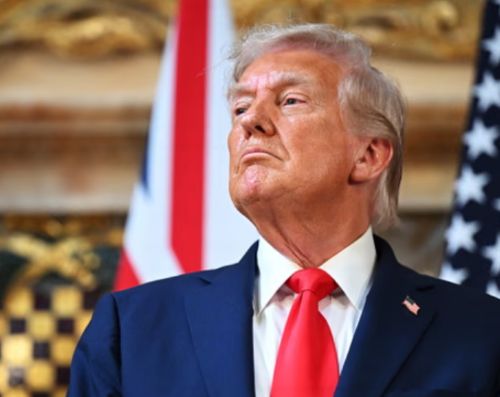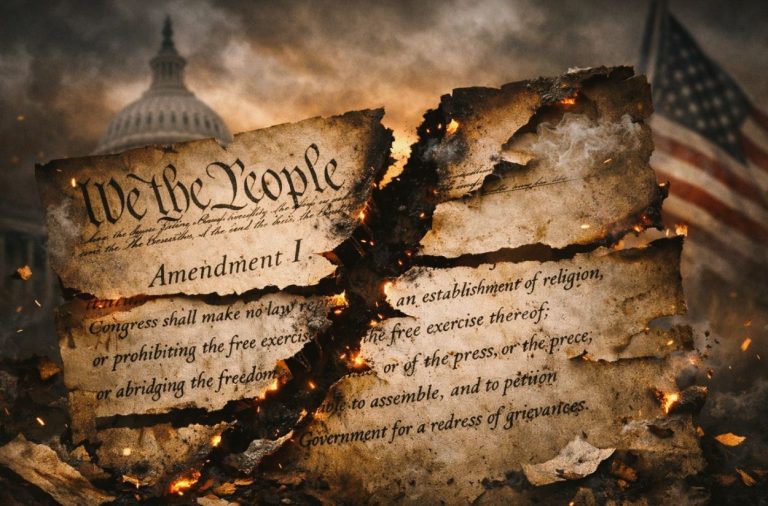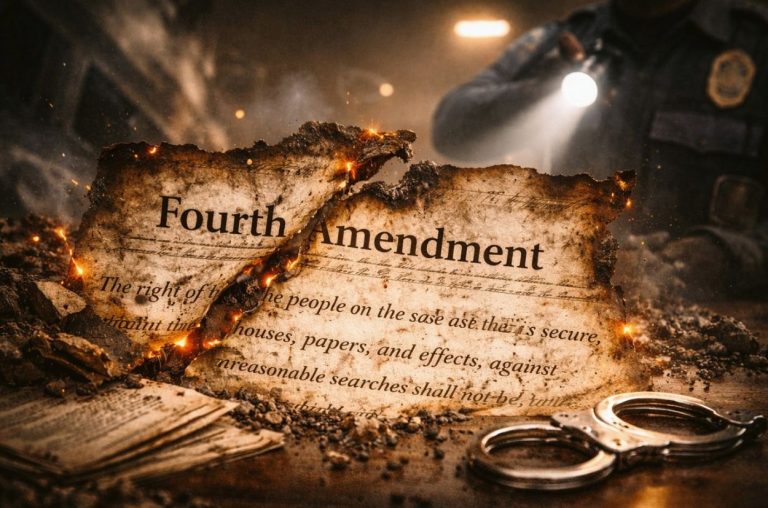

The Trump administration’s use of the Department of Justice as a political cudgel is no longer theoretical; it is now policy.

By Matthew A. McIntosh
Public Historian
Brewminate
Introduction
The United States Department of Justice was once held up as the emblem of the rule of law, a bulwark separating political power from legal process. Under President Trump’s administration, that barrier has been all but dismantled. In recent months, the DOJ has pursued and obtained indictments against former FBI Director James Comey and New York Attorney General Letitia James and is reportedly preparing criminal charges against former National Security Advisor John Bolton. Each of these figures has one thing in common: open opposition to Trump in years past.
The cases themselves appear fragile. A central witness in the Comey indictment has already contradicted the prosecution’s key claim. Legal analysts note that the evidence against Letitia James, a figure long vilified by Trump after her civil fraud case against him, is tenuous at best. Meanwhile, reports indicate that the DOJ is preparing to bring charges against Bolton, one of Trump’s most outspoken former aides. Together, these actions form a pattern that observers across the political spectrum warn is unmistakable: the transformation of the nation’s chief law enforcement agency into a tool of personal vengeance.
This is not mere political hardball; it is retribution codified through the machinery of the state. The Department of Justice, once bound by norms of independence established after the Watergate scandal, now moves at the will of a president who publicly names his targets and demands prosecutions. Trump’s recent appointee to the post overseeing these cases, Lindsey Halligan, is a longtime loyalist who has drawn sharp criticism for her lack of prosecutorial experience and overt political allegiance.
To call this unprecedented would be inaccurate; history has seen such abuses before. Authoritarian leaders have always sought to bend justice into an instrument of fear. The United States, it seems, is now being tested by the same temptation. The question is no longer whether Trump will use the Justice Department against his perceived enemies, but whether America’s democratic institutions will resist, or merely adapt to a new order in which law itself becomes a weapon.
Background / Context
The weaponization of the Department of Justice did not begin overnight, nor did it emerge in a vacuum. The American legal system rests on the premise that no individual, not even the president, may direct prosecutions for personal or political gain. That principle, tested in moments from Watergate to the Iran-Contra affair, forms one of the most fragile boundaries in a constitutional republic. Yet the Trump administration’s second term has pressed upon that boundary with unrelenting force, fusing partisan grievance with executive power in a way that few modern democracies have survived intact.
After the Watergate scandal, a series of reforms sought to insulate the DOJ from political interference. Attorneys general, beginning with Edward Levi under President Gerald Ford, established the doctrine of arm’s-length independence, ensuring that investigations into political figures would be handled without White House influence. For decades, that convention held, even under intense partisan pressure. Trump has reversed it outright. In his first months back in office, he reinstated the Weaponization Working Group, a panel nominally created to “investigate political bias” in federal law enforcement but which critics describe as a clearinghouse for retribution.
The purge of institutional dissent soon followed. Trump’s DOJ reassigned or dismissed multiple U.S. attorneys and senior prosecutors who resisted politically motivated cases. In their place came figures like Lindsey Halligan, a Florida attorney with ties to Trump’s personal legal defense team, appointed to oversee sensitive investigations into former officials. This move shattered decades of precedent separating campaign lawyers from prosecutorial authority.
To those who remember history, this is not simply a partisan reshuffle. It mirrors the early stages of what scholars of authoritarianism describe as judicial capture: the subordination of legal institutions to executive control through selective loyalty and intimidation. Leaders from Hungary’s Viktor Orbán to Russia’s Vladimir Putin have employed the same technique, cloaking political vendettas in the language of legality. When prosecutors learn that certain targets are untouchable, and others must be punished, the line between justice and power ceases to exist.
Trump’s rhetoric has only sharpened the threat. On his Truth Social account and in public rallies, he has explicitly called for “accountability” for those who “lied” or “tried to destroy” him, naming Comey, James, Bolton, and even sitting judges. The result, as one former federal prosecutor said, is “a climate of prosecutorial fear,” where professional staff understand that independence is not rewarded, and loyalty is mandatory.
This is the backdrop against which the indictments now unfolding must be understood. The cases against Comey, James, and Bolton are not isolated legal proceedings; they are the outcome of a broader project to redefine justice as political obedience. If successful, they will mark not only the erosion of institutional restraint but the normalization of vengeance as governance.
Targets and Indictments
James Comey
Few names carry as much symbolic weight in the Trump era as James Comey’s. The former FBI director, fired by Trump in 2017 after refusing to pledge personal loyalty, has long stood as a focal point of the president’s resentment. His recent indictment, on charges of false statements and obstruction tied to his 2020 Senate testimony, reflects that personal vendetta elevated to the level of state action.
The DOJ’s case began to falter almost immediately after it was announced. A key witness recanted a portion of their statement, undercutting the prosecution’s central claim that Comey intentionally misled Congress. Prosecutors reportedly acknowledged that the evidence was weak but pressed forward under direction from senior officials aligned with Trump’s Weaponization Working Group. Comey’s defense team has described the indictment as “a transparent act of political retaliation.”
Public reaction has been swift. Even some conservatives have expressed discomfort with the precedent such a prosecution sets, warning that it risks eroding the perceived neutrality of the DOJ. If a president can jail his critics by decree of loyalty, we no longer have a Justice Department; we have an instrument of fear.
Letitia James
The indictment of New York Attorney General Letitia James represents perhaps the most overt act of retribution yet. James, who led the state’s civil fraud case that resulted in massive penalties against Trump and his organization, was charged with mortgage and bank fraud in September, allegations described as “dubious and politically tinged.” The indictment claims she misrepresented occupancy details on a personal mortgage more than a decade ago, an issue typically handled through civil penalties, not criminal prosecution.
The case immediately drew skepticism from legal scholars. A central DOJ official admitted that the investigation bypassed several internal review steps and was “not consistent with standard practice.” Trump himself publicly celebrated the charges, calling James “the most corrupt attorney general in America” and proclaiming that “justice finally caught up.”
Yet the optics are unmistakable: a president using federal prosecutors to punish the state official who most effectively challenged his business empire. The irony is that the case, by most accounts, lacks legal weight. Even a favorable jury might struggle to find intent or criminality beyond a technical discrepancy. Senior DOJ staff privately concede that the evidence wouldn’t survive a competent motion to dismiss.
Still, the prosecution serves its political purpose. The spectacle of Letitia James under indictment achieves what authoritarian leaders throughout history have understood: it blurs the moral line between the accuser and the accused, creating the illusion that everyone is corrupt, and therefore, the strongman is justified in punishing his enemies.
John Bolton
If Comey and James represent Trump’s old political adversaries, John Bolton represents something more intimate: betrayal from within. Once Trump’s national security advisor and later one of his most public critics, Bolton became a lightning rod after publishing a memoir in 2020 that exposed internal dysfunction and alleged misconduct within the administration.
Now the DOJ is preparing to indict Bolton on charges related to mishandling classified information, a claim Bolton’s attorneys argue is “absurdly retaliatory.” The alleged infraction concerns documents already reviewed by intelligence officials years earlier, when Bolton faced a prior dispute over his book’s publication clearance. That matter was resolved without charges, making the sudden revival of the case a clear signal of political reprisal.
Bolton’s legal team has framed the move as “a warning to anyone who speaks out.” And indeed, the pattern is unmistakable: each target represents a distinct episode of resistance to Trump’s authority: one dismissed him, one prosecuted him, one exposed him. Each now faces the full weight of the federal government under a Justice Department reengineered to punish disloyalty.
Together, these cases illustrate a grim continuum: the transformation of law into an instrument of personal vengeance. The defendants are almost secondary. The true target is the principle that the law applies equally to all, including those in power.
Patterns and Mechanisms of “Weaponization”
The machinery of retribution does not operate in chaos. It thrives on structure, a deliberate repurposing of institutional mechanisms to achieve political control under the guise of legality. What has unfolded within Trump’s DOJ reflects a careful orchestration of personnel, rhetoric, and procedural manipulation designed to turn the law inward on itself.
The first mechanism is direct presidential pressure. Trump has long made a public spectacle of demanding investigations and prosecutions, from his early calls to “lock up” Hillary Clinton to his Truth Social posts in recent months explicitly naming James Comey and Letitia James as “criminals.” Under Attorney General Andrew Bailey, these demands are no longer idle rhetoric. Prosecutors now receive directives that trace back to the president’s own statements. In the Comey case, one former DOJ official told NPR that “the instruction was unambiguous; get results, not process.”
The second mechanism is personnel control. By removing experienced prosecutors and replacing them with political loyalists like Lindsey Halligan, Trump has established a command structure that bypasses internal dissent. Halligan’s appointment to oversee politically sensitive cases, despite her lack of prosecutorial experience, signals a transformation of the DOJ into what one legal scholar termed “a presidential litigation bureau.” Seasoned attorneys who object are reassigned, pressured into early retirement, or quietly replaced.
A third mechanism involves the use of institutional veneers: committees, task forces, and review panels that grant partisan action the appearance of bureaucratic legitimacy. The so-called Weaponization Working Group functions not as an oversight body but as a political filter, identifying individuals deemed “biased” or “hostile” to the administration. Its reports have been used to justify investigations of journalists, judges, and former officials.
Even procedural tools are being twisted toward political ends. Traditional checks (internal review boards, evidence vetting, or conflict-of-interest clearances) are now treated as obstacles rather than safeguards. Prosecutors working on politically sensitive cases describe a culture in which hesitation is punished and compliance rewarded. The message is unmistakable: loyalty outweighs legality.
Perhaps most dangerously, Trump has succeeded in normalizing the language of persecution. By accusing his opponents of the very crimes he was charged with and convicted of, he cultivates a moral inversion that renders accountability suspect and vengeance righteous. When Letitia James was indicted, Trump declared that the real lawbreakers are the ones who went after him. This rhetorical pattern, the projection of guilt onto accusers, is a hallmark of authoritarian governance, transforming political opposition into criminality through repetition rather than proof.
The cumulative effect is not simply the politicization of justice, but its inversion. The law no longer serves as a constraint on power; it has become a weapon to consolidate it. Those who prosecute corruption are now the accused. Those who violate the law declare themselves victims of it. The courtroom becomes not a venue for evidence but a stage for propaganda.
What emerges from this pattern is a government that has abandoned the neutral administration of justice for the spectacle of domination. As scholars of democracy have warned, once a state learns to wield law as theater, it seldom returns to principle without crisis.
Legal and Constitutional Risks
At the heart of these prosecutions lies a constitutional fault line, the point at which executive authority collides with the independence of justice. The Department of Justice was designed to serve the law, not the president. Its conversion into an arm of political enforcement exposes a profound tension between the letter of legality and the spirit of democracy.
The most immediate danger is the erosion of due process. Every defendant, no matter their status, is entitled to an impartial investigation and a fair trial. Yet when prosecutions are initiated at the direction of a sitting president with personal stakes in their outcome, the presumption of neutrality collapses. In the Comey case, defense filings have already cited “vindictive prosecution,” a doctrine rooted in Supreme Court precedent, which holds that criminal charges motivated by retaliation for protected expression violate the Constitution. Courts have rarely invoked it against a sitting administration, but as one former federal judge told CNN, “these cases may force a reckoning we haven’t seen since Watergate.”
A second concern is separation of powers. The framers of the Constitution vested the executive with law enforcement authority but placed its exercise under congressional and judicial oversight. Trump’s consolidation of prosecutorial control, including his installation of Lindsey Halligan over politically sensitive cases, has blurred that boundary. The Senate’s attempts to challenge her appointment on procedural grounds have so far stalled, revealing how fragile the checks on executive appointments become when partisan allegiance eclipses institutional duty.
The judiciary now stands as the final buffer. Federal judges have broad discretion to dismiss politically tainted prosecutions, but few are eager to trigger a constitutional showdown with a president who has publicly threatened them by name. As Reuters has reported, several Trump-appointed judges have already recused themselves from these cases, citing either appearance of bias or personal safety concerns. Those who remain face unprecedented scrutiny, knowing that any ruling against the administration could invite political reprisal.
Within the DOJ itself, institutional backlash simmers beneath the surface. Career prosecutors and staff attorneys have leaked accounts of internal dissent, memoranda questioning the evidentiary basis of the Comey and James indictments, complaints of political coercion, and pressure to sign off on filings they consider unfounded. Yet whistleblower protections offer little refuge in an environment where loyalty is equated with patriotism.
The broader constitutional risk lies in precedent. Once a president successfully bends the DOJ to his will, the act itself becomes part of the political toolkit. Future administrations, regardless of party, will inherit a reshaped institution accustomed to serving power rather than constraining it. The longer this continues, the harder it becomes to imagine an apolitical Justice Department ever returning.
What makes this moment perilous is not only the abuse of power but the normalization of it. If courts, Congress, and the public accept these prosecutions as legitimate political theater, the architecture of the republic begins to warp around the personality of a single man. The Constitution, designed to prevent monarchy, was never built to withstand a citizenry that ceases to believe in its own boundaries.
Political Stakes and Broader Implications
The transformation of justice into a political weapon carries implications that reach far beyond the courtroom. Each indictment, no matter how weak or performative, sends a message to those who oppose power: dissent carries risk. That message, amplified through media spectacle and presidential rhetoric, reshapes the public’s understanding of legitimacy itself. When law is wielded as punishment rather than protection, trust in institutions erodes, and with it, the foundation of democratic stability.
For Trump, this campaign of retribution serves multiple political purposes. It reinforces his narrative of victimhood that he, not his critics, is the true casualty of corruption and reframes accountability as persecution. It also consolidates loyalty within his party. By publicly rewarding allies and punishing opponents, Trump reasserts his dominance over the Republican hierarchy, reminding both supporters and rivals that obedience is a condition of survival. As one strategist noted, “It’s not about convictions. It’s about control.”
The effect on democratic norms is corrosive. Citizens witnessing the spectacle of former officials and prosecutors under indictment learn to see law not as an impartial arbiter but as a weapon of the powerful. Over time, that cynicism becomes complicity. Authoritarianism does not emerge solely through violence or decrees; it flourishes when the public begins to accept political prosecutions as ordinary governance.
The GOP itself faces a reckoning. While many lawmakers privately express unease, few dare to challenge Trump openly. Those who do, like Senator Mitt Romney before his retirement, have faced intense backlash from within their own ranks. The silence of institutional conservatives has allowed a dangerous precedent to take root: that the pursuit of power justifies the corruption of process. If this logic holds, no future president will resist using the DOJ as a partisan instrument, only to wield it in the opposite direction.
Internationally, America’s credibility as a constitutional democracy has begun to fracture. Democratic allies have expressed alarm at the spectacle of a U.S. president targeting domestic opponents through criminal prosecution. Human rights organizations, including Freedom House, have warned that the United States now exhibits the same institutional degradation long documented in Hungary, Turkey, and Brazil. For a nation that once exported the rule of law as moral currency, the reversal is stark.
What emerges is a new political landscape, one defined by fear, submission, and selective enforcement. Prosecutors learn to read the president’s moods before the statute book. Judges navigate between law and survival. Citizens adjust their expectations of justice to the demands of power. In such a system, innocence and guilt become secondary; what matters is loyalty.
The long-term consequence is not merely a damaged DOJ but a culture of resignation. The more often the public witnesses the powerful escaping consequence while the innocent are pursued, the more distant the idea of equal justice becomes. As a popular axiom goes, often attributed to Hannah Arendt, “The beginning of tyranny is the end of belief in facts.” America is approaching that edge, not through a single act of repression, but through the slow habituation to it.
Conclusion
What began as spectacle has hardened into strategy. The Trump administration’s use of the Department of Justice as a political cudgel is no longer theoretical; it is now policy. Through the cases against James Comey, Letitia James, and John Bolton, Trump has demonstrated that the instruments of justice can be made to serve the ambitions of one man. Each indictment erodes the distinction between the rule of law and the rule of power, until one begins to speak the language of the other.
The implications reach far beyond the fates of the accused. Every time the state is used to punish dissent, the boundary between democracy and autocracy grows thinner. The strength of the American system has never rested solely on its written laws but on the moral restraint of those who wield them. When that restraint collapses, laws remain, but liberty dissolves. The legal process becomes theater, the appearance of justice concealing its absence.
Trump’s defenders will argue that his actions are lawful because they follow procedure, that indictments and trials give the aura of legitimacy. But history teaches that authoritarianism rarely begins with lawlessness; it begins with the repurposing of law itself. From Hitler’s “Decree for the Protection of the People and the State” to modern strongmen who govern by prosecution, the path is marked not by the suspension of law but by its corruption. What makes such leaders dangerous is not their contempt for legality, but their mastery of it.
The question now confronting the United States is not whether this weaponization will end, it is whether the nation’s institutions will remember their purpose before it is too late. Courts may dismiss charges, juries may acquit, and public outrage may flare, but unless the broader culture of impunity is confronted, the precedent will remain. Each repetition dulls outrage and deepens acceptance.
A republic cannot endure when justice is feared more than crime. If America allows vengeance to replace principle, it will not need a dictator to end democracy, the people themselves will have done it, one indictment at a time.
Originally published by Brewminate, 10.15.2025, under the terms of a Creative Commons Attribution-NonCommercial-NoDerivatives 4.0 International license.


